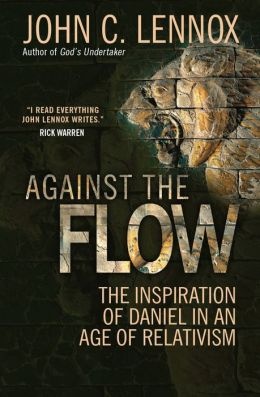A Review of Against the Flow: The Inspiration of Daniel in an Age of Relativism, by John Lennox
In the early sixth century BC, four Hebrew boys, probably teenagers at the time, were forcibly deported from the tiny state of Judah in Israel to live out their lives in service to the Babylonian king Nebuchadnezzar. It would have been easy for Daniel and his three friends to forget the history of their people and the God who had revealed himself to them through it, and to adopt instead the pagan worldview of this vast, spectacular city, the greatest city in the world at the time.
But they didn’t do that. Nor did they constrain their worship of the God of Abraham, Isaac, and Jacob to their own subjectivized, private sphere for the sake of public amicableness. Instead they lived out a tactful, unapologetic witness in a pluralistic culture that grew increasingly hostile to their faith.
Their world was in many ways much like ours, says Oxford scientist John Lennox. And there is much we can learn from Daniel’s record of the extraordinary events that took place in Babylon. Daniel reveals:
The reality of the supernatural. Although the Babylonians were superficially religious (the city had more than a thousand temples), their prevailing origin narrative held that the gods had emerged out of some primeval combination of material substances. And so in this sense the Babylonian worldview parallels the materialism of our day. This philosophical metanarrative falls far short of the Hebrew boys’ monotheistic faith which knows God as the transcendent, self-existing Being who created all matter and energy. As events in Babylon played out, though, it became apparent to Babylonian kings and peasants alike that Daniel’s God was a Being of a whole different order than anything in Babylon’s pantheon. Daniel’s God communicated through dreams and divine actions. And he revealed through such interventions profound realities that no ordinary human being could know.
The absolute supremacy of God. Also, similar to secular states of our day, Babylon’s rulers were wont to demand homage that should only be rendered to God. But while Daniel and his friends served Nebuchadnezzar with integrity and faithfulness, when pressed to worship him or his idol, they refused, even on pain of death. On at least three occasions, God manifested his supremacy directly to Babylon’s king, revealing that he and he alone is worthy of worship.
The sovereignty of God behind world history. In the final six chapters, Daniel relates several great and sweeping visions concerning future events on the world stage, much of which he did not fully understand. Some are still yet to be fulfilled, but others were subsequently fulfilled in such precise detail that skeptics asserted the book of Daniel had to have been written centuries later by someone other than Daniel (a view that Lennox argues persuasively against).
Lennox describes Against the Flow as an “apologetic exposition” – a work designed to show how Scripture engages with the big worldview questions people are asking today. He has accomplished that goal with both profound depth and remarkable ease of readability.
“The story of Daniel and his friends is a clarion call to our generation to be courageous; not to lose our nerve and allow the expression of our faith to be diluted and squeezed out of the public space and thus rendered spineless and ineffective,” he writes. It’s an objective, he concedes, that may not be achieved without cost. But as the life of Daniel attests, it’s an objective worth living for at any cost, even death.
This review first appeared in Salvo 35, Winter 2015.
